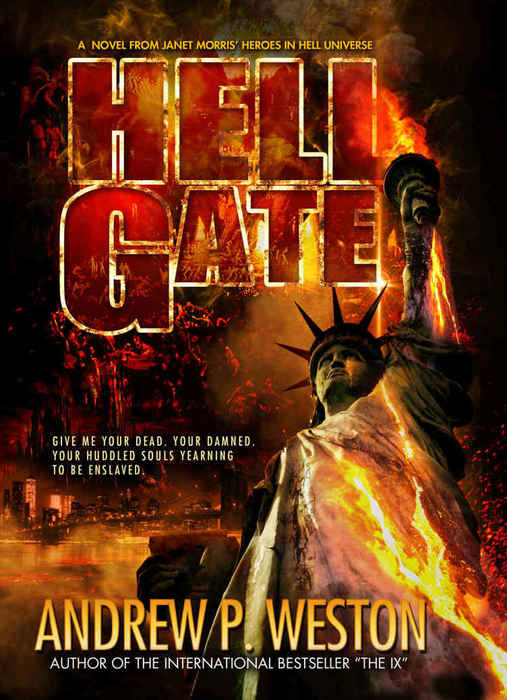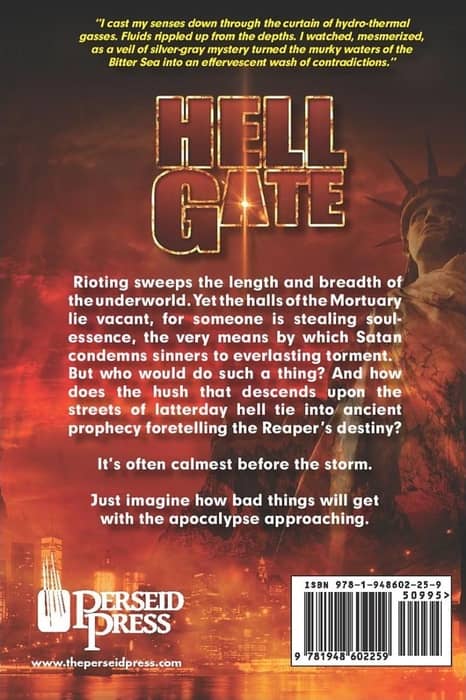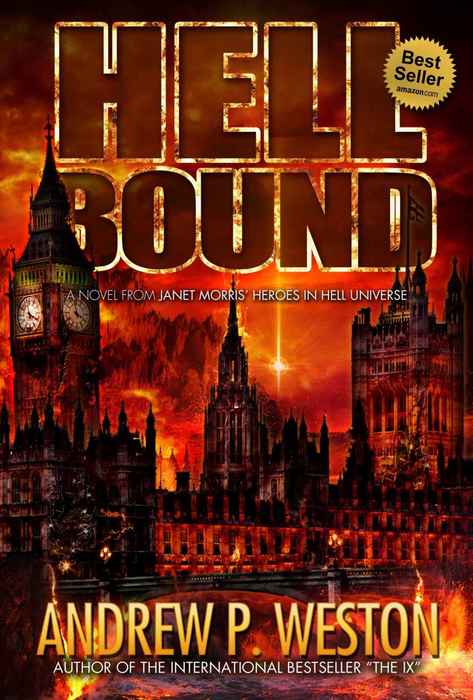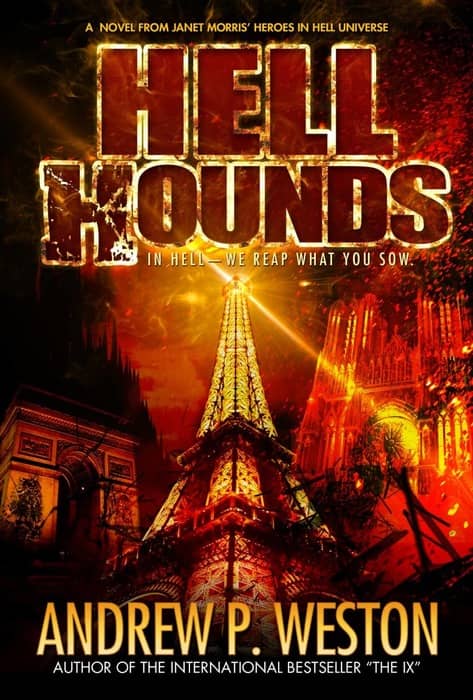Who is Daemon Grim? Hell Gate by Andrew P. Weston
 |
 |
Cover by Roy Mauritsen
Back in the Underworld with Andrew P. Weston’s Hell Gate. Published by Perseid Press. Copyright © 2019 by Janet Morris and Andrew P. Weston. 523 pages. Cover art and design by Roy Mauritsen
Hell Gate is Weston’s third novel set in Janet Morris’ Heroes in Hell ™ universe, the first two being Hell Bound (2015) and Hell Hounds (2017) — both of which I previously reviewed for Black Gate. The trilogy is all about the exploits of Daemon Grim. So, who is Daemon Grim? He’s Satan’s Enforcer. The Devil’s Hitman. The Prince of Darkness’ Henchman. He’s like the James Bond of Perdition, armed with a nasty array of infernal weapons and gadgets. Add to the mix his Satanic-gifted powers, and he’s either Hell’s superhero or supervillain, depending on your point of view.
In short, Daemon Grim is one bad-ass, damned soul.
If Hell were real it would be peopled with all sorts of damned souls and their keepers, like Daemon Grim, the Devil’s elite henchman. Daemon likes nothing more than a job well done for the Prince of Lies, with attention to every detail no matter how insidious. In HELL GATE, the third and climactic volume of Andrew P. Weston’s murderous chronicles of infernal intrigue, Daemon is out to tie up Satan’s loose ends and settle some of the underworld’s outstanding accounts. Meanwhile, even Daemon has only so much license and the Boss is waiting . . . [official book blurb]
Much like our modern world, Hell is in a state of horrific transition. The plagues sent by Erra, the Akkadian god of mayhem and pestilence who’s been sent to “Make Hell Hellish Again,” are causing widespread chaos and purging. Strikes and riots amidst the ever-present violence, which are part of everyday Unlife in Hell, continue to break out in a full-tilt orgy of horrendous and Biblical proportions. While these devastating viral outbreaks and catastrophic disruptions in the very fabric of the Netherworld persist in wreaking havoc in His Satanic Majesty’s own backyard, Grim and his cadre of secret agents, the Hell Hounds, are still hot on the trail of Frederick Chopin and Nikola Tesla, whose own devilish plans would receive a standing ovation from Satan himself — if he wasn’t their main target. And in this novel, we finally learn what their evil machinations are all about. Unknowingly their pawn, Grim plays cat and mouse with that most unlikely and dastardly duo, desperate to foil their plans.
Plus, someone is stealing the reanimating Unlife force, siphoning the sin out from under the very nose of the Undertaker himself. Interrupting and confounding his efforts to Reassign souls after they “die” in one manner or another, it’s making his job tough, to say the least. Are Chopin and Tesla behind all this? Could they be involved in the mystery of the missing souls? The Undertaker wants to know, and he needs Grim’s help. In this final volume of Weston’s trilogy, we finally learn what Chopin’s and Tesla’s evil machinations are all about. Unknowingly their pawn, Grim plays cat and mouse with the dastardly duo, desperate to foil their plans. The main story, however, deals with Grim’s mysterious past, something readers have been hungering to know since the first volume, Hell Bound.
Grim certainly has his hands full in this one.
 |
One of the more interesting aspects of Weston’s trilogy, and indeed, of the entire Heroes in Hell™ shared-universe, is the concept of “death” in Hell. You might assume there’d be no fear of dying, since the damned are already dead. But the fear of death is instinctive, bred in the blood and bone of the living, and carried over from life. The concept of having bodies in Hell, what’s called necroflesh, makes Perdition all the ghastlier and more punitive. Souls are given necroflesh bodies upon falling into Hell, exact replicas of the bodies they had when they were alive, because it adds to the torments and punishments they’ll experience. Having these bodies means they can still feel pain, and thus the fear of “dying” is still with them. When you die in Hell, your body evaporates, disintegrates, and returns to the Mortuary, also called Slab A, where the nameless and hideous Undertaker or his equally grotesque assistant, Gorgonous, will Reassign you and then send you back out into Hell for another round, most often a little worse for wear. Sometimes they’ll remove certain parts of your necroflesh body or your internal organs. At other times they’ll add a limb or second head, remaking you as their own devious and sadistic whims see fit. But there is another fear even greater than this, and that is the fear of Obliteration — the fear of having your entire existence erased. In short, you will never have existed at all. And what with Erra’s plagues and Satan’s purge, Obliteration is Fear #1.
Friend and colleague, Seth Lindberg, describes Weston’s Hell novels as “Hell Noir,” and it’s a most apt description. Weston weaves a complex plot worthy of any great mystery novel, and this one reads like a fast-paced spy thriller or secret agent novel. There are plenty of twists and turns and surprises to fill a half dozen novels. Hell Gate is part horror, part science fiction, part fantasy, and topped off with mysticism, metaphysics, humor and plenty of action. The characters are rich and well-developed, each with a solid personality that gives them a three-dimensional reality and breathes life into these long-dead, lost souls. Because time is totally irrelevant in Hell, people from all eras of earth’s history — past and present — are on stage here. And just about every damned one of them works full-time trying to outwit Satan, as well as each other. Besides Chopin and Tesla, some of the other players in this infernal universe include: Saint Teresa of Ávila, Heinrich Cornelius Agrippa von Nettesheim, Doctor David Livingston, Queen Isabella Castile, and Amantine Dupin, also known by her pen name, George Sand, to name a few. Each of these characters has his or her own agenda, and it’s fun to see how they circle around one another, playing their games, forging alliances, committing acts of betrayal and bloody mayhem. Weston outdid himself on this one. A fantastic read, and the ending is both surprising and most satisfying.
So, who is Daemon Grim?
My lips are sealed. You’ll just have to pick up a physical or Kindle copy of the book(s) and find out for yourself.
 |
 |
Joe Bonadonna is the author of the heroic fantasies Mad Shadows: The Weird Tales of Dorgo the Dowser (winner of the 2017 Golden Book Readers’ Choice Award for Fantasy); Mad Shadows II: Dorgo the Dowser and the Order of the Serpent; the space opera Three Against The Stars; the Sword-and-Planet space adventure, The MechMen of Canis-9; and the Sword & Sorcery adventure, Waters of Darkness, in collaboration with David C. Smith. With co-writer Erika M Szabo, he wrote Three Ghosts in a Black Pumpkin (winner of the 2017 Golden Books Judge’s Choice Award for Children’s Fantasy), and The Power of the Sapphire Wand. He also has stories appearing in: Azieran—Artifacts and Relics, GRIOTS 2: Sisters of the Spear, Heroika: Dragon Eaters, Poets in Hell, Doctors in Hell, Pirates in Hell, Lovers in Hell, and the upcoming Mystics in Hell; Sinbad: The New Voyages, Volume 4; and most recently, in collaboration with author Shebat Legion, he wrote Samuel Meant Well and the Little Black Cloud of the Apocalypse. In addition to his fiction, he has written a number of articles and book reviews for Black Gate online magazine.
Visit his Amazon Author or his Facebook Author’s page: Bonadonna’s Bookshelf
Joe Bonadonna has been a contributor to Black Gate since 2011, recently shedding light on writing: IMHO: Giving Voices to Your Characters.
Thank you Joe – And of course, to the team at Black Gate. Your support, views and comments are all very much appreciated. And glad you enjoyed the ride. Stay tuned.
You’ll see . . .(Cue Vincent Price laughter)
You’re very welcome, Andrew. Always a pleasure. Glad you liked the review.
And thank you, John and Seth, for another excellent presentation of my review, and for allowing me to express my humble opinion.
Always a pleasure to host you at Black Gate, Joe!
Thanks again, John. Always a pleasure to be here.